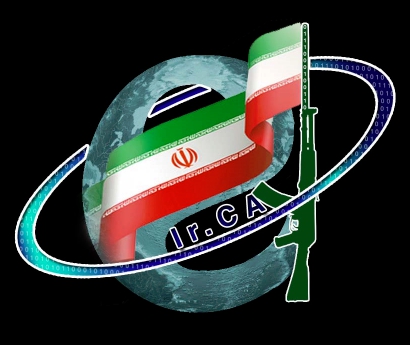Iran Enriching… Internet Hackers

The “Cyber warfare” is no longer a virtual warfare, but it is a real and effective war more than anyone can imagine. It stems from the idea of “espionage” and “hacking”, to include “defensive” and “offensive” terms. It is the opposite side of the military and political wars, and acts as part of the psychological warfare.
Iranian cyber armyEarlier, media in America began to warn of Iran’s growing cyber capabilities. Despite the fact that it has been ranked the third worldwide in terms of power comparing with the United States and its allies or with China and Russia, the U.S. media is recommending not to fear of the “default enemy” represented in “China’s hackers”, but of “stronger” and “dangerous” enemy i.e. “Iran’s hackers”.
In May 2013, the “Center for American Progress” website published a report on the seriousness of the “Iranian hackers”, indicating that “China is executing cyber-espionage campaign against major U.S. corporations and sources of information, yet the Iranian hackers are more aggressive, for they target vital infrastructure, or involve in acts of economic sabotage, as orchestrating cyber attacks against financial institutions”.
The report pointed out that the latest cyber attacks, of which Iran has been accused, exceeded jamming or causing chaos through using the Distributed Denial-of- Service “DDoS” or the Denial-of-Service “DoS” attacks. This system inundates websites with useless data, where the hackers control the data that is being sent, what leads the website to slow down or to stop working.
A report entitled: “Forget China: Iran’s hackers are America’s newest cyber threat”, published in the “Foreign Policy” magazine a few days ago, mentioned that Iran has developed during the past two years its cyber capabilities to the extent that enables it to compete the world’s superpowers in cyberspace. According to the “Foreign Policy”, Iran was motivated to ramp up its cyber security efforts, particularly the defense of its internal networks and vital infrastructure facilities, after a cyber attack on an Iranian nuclear facility by the United States and Israel.
According to the same the magazine, analysts are still debating about whether Iran should yet be included in the same league as the United States, Israel, or China, in terms of cyberwarfare or as the American intelligence believes it is well “on the path to becoming a formidable cyber force”.
The “Wall Street Journal” citied U.S. officials as saying that the United States in 2013 accused Iranian hackers of penetrating US Navy Marine Corps intranet. The electronic attack prompted the U.S. Navy to recruit new specialists in the field of cybersecurity to contain the penetration, what required four months of practical efforts, and offering more than 10 million dollars in compensation.
Commenting on it, James Lewis, a researcher who have specialized in cybersecurity in the “Center for Strategic and International Studies”, considered that “the Iranians were working to build their capabilities in the field of cybersecurity since about seven years”, talking at the same time about their “ability to perform things that could be hurtful”.
In December 2011, Google’s chief executive officer commented on Iran’s cyber activities, declaring that the Iranians “were able to control network traffic”. He explained in an interview with the American “CNN” that “the Iranian hackers have transformed the flow of information from Denmark to Iran and then returned it to Denmark”. He concluded by saying that “the Iranians are unusually talented in the field of the cyberwarfare, for an incomprehensible reason”.
Also, a report published by the “BBC” (Persian) network, demonstrated that “the Iranian electronic army” consists of professionals highly skilled in the field of information technology and professional hackers who avoid disclosing their identity. This informal group does not yet fall under the banner of any Iranian government association or any agency that specializes in this field. According to the “BBC”, the capabilities of the “Iranian electronic army” enabled it to infiltrate many foreign media websites, as well as “Twitter” and some Western government sites.
On the other hand, the “Foreign Policy” report was keen not to overlook “the Supreme Council of cyberspace”, which is the highest in the Iranian “cyber” system. The Iranian Republic’s Supreme Leader Ali Khamenei established the Council in March 2012, which is headed by the Iranian President Hasan Rouhani, as it includes among its members senior government officials, as well as the head of the Iranian Revolutionary Guard. After its establishment, the entire Iranian cyber organizations implement the policies it approves.
This Council is part of a sophisticated and complex structure. It includes the “Cyber- Defense Command”, which was established in 2010, and which operates under the command of “Iran’s Civil Defense Organization”. According to the head of the Organization Brigadier General Gholam-Reza Jalali, its “leadership” plays the role of protecting the country’s infrastructure against the cyber threats. Also, the Council includes Iran’s Electronic Police called “Vita”, which confronts Internet crimes and deception, and fights against “political and security crimes”, in addition to monitoring Internet cafes. As for the “Monitoring Committee”, established by the “Supreme Council of the Cultural Revolution” that is under the control of the Supreme Leader of the Republic of Iran, its task is to monitor the unauthorized sites.
Even though Iran considers this structure as “defensive”, the Western media describes it as an “offensive” one. In its report, the “Foreign Policy” insisted on highlighting the fear of Iran’s technological progress, signifying that “the Supreme Council of cyberspace” “contributes to developing new ways to infiltrate or to attack online networks of the enemies”.







